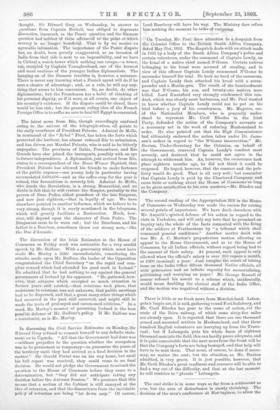On Tuesday, Mr. Paul drew attention to a despatch from
the Colonial Office to the British South Africa Company, dated May 31st, 1892. The despatch deals with an attack made in 1892 by a body of the South Africa Company's police and certain volunteers, under the command of Captain Lendy, on the kraal of a native chief named N‘Gomo. Certain natives belonging to his kraal were accused of stealing, and in view of this offence Captain Lendy summoned N(Gomo to surrender himself for trial. He took no heed of the summons, and Captain Lendy then attacked his kraal with a seven- pounder and a Maxim-gun. The result of the bombardment was that N`Gomo, his son, and twenty-one natives were killed. Lord Knutsford very strongly condemned this con- duct, which was clearly most barbarous, and Mr. Paul wanted to know whether Captain Lendy could not be put on his trial before a jury of his countrymen. Mr. Maguire, one of the Nationalist Members, who is generally under- stood to represent Mr. Cecil Rhodes in the Irish Party, defended the action of the Company's servants as a necessary act in the work of reducing Mashonaland to order. He also pointed out that the High Commissioner had ultimately endorsed the action taken under Dr. Jame- son's orders in regard to "the N'Gomo insurrection." Mr. Buxton, Under-Secretary for the Colonies, on behalf of the Government, censured Captain Lendy's conduct niost severely, and declared that he could not agree in the attempt to whitewash him. As, however, the occurrence took place eighteen months ago, he did not think it could be reopened. He hoped, however, that the censure and the pub- licity would do good. That is all very well ; but remember that Captain Lendy is paid by the Chartered Company, and cares little or nothing about the House of Commons 'so long as he gives satisfaction to his own mastere,—Mr. Rhodes and the Company.


































 Previous page
Previous page